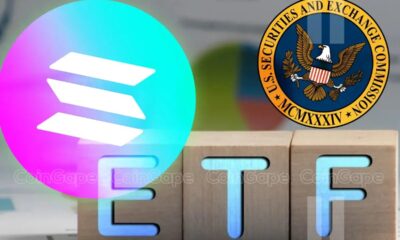Blockchain
TOKEN2049 Singapore main highlights
Published
3 months agoon
By
admin

TOKEN2049 has ended in Singapore. Here are three highlights from one of the most anticipated crypto conferences of the year.
One of the largest industry conferences, TOKEN2049, was held from Sept. 18 to 19 in Singapore. It brought together leading figures in the crypto space, who shared their thoughts on trends, developments and priorities for the industry.
What will the crypto industry be like in three years?
One of the highlights of the event was a panel entitled “The Next 3 Years in Crypto,” during which several leaders of major crypto projects discussed where the industry is heading in the near term. Stablecoin issuer Circle‘s CEO Jeremy Allaire, top crypto exchange OKX‘s founder and CEO Star Xu, and Ethereum co-founder Vitalik Buterin participated in the panel discussion and spoke about the digital asset sector’s future, sharing stories from their past experience as long-time participants and leaders in the space.
Self-custody is key
During the panel, OKX’s Xu noted the importance of self-custody technologies for storing cryptocurrency, given their relatively high level of security. However, he also pointed out that promoting self-custody in the crypto industry — meaning holding your crypto yourself instead of using a third-party, like an exchange — does not imply that there is no need to regulate the space.
Speaking about the future of digital assets, Xu noted that over the past ten years, the industry has seen many important technological developments. However, he believes that web3 applications and use cases should be developing even faster.
Less focus on NFTs
Buterin mentioned that one of the main advantages of digital assets is their international, borderless nature. He reiterated the notion that the industry has the potential to meet the needs of people globally who do not have access to the traditional financial system.
He also pointed out the need for practical use cases to drive the mass adoption of digital assets. Buterin called for less focus on expensive NFTs, arguing that they have no real benefits for the industry or for humanity.
The co-founder of Ethereum also said that he believes that improving security in the crypto industry should be a major focus, alongside trying to reduce transaction fees.
Vitalik comments on the accessibility of crypto and sings a crypto song
Buterin also touched on topics such as the accessibility of cryptocurrencies, their use as a means of payment, and security in the ecosystem as a whole.
He argued that it’s no longer valid to say that it’s too early for more widespread adoption of crypto. He compared the extremely limited awareness and adoption of Bitcoin (BTC) in 2013 with the situation just eight years later, in 2021, when a cup of coffee could be bought for Ethereum (ETH) in Argentina.
In between talking about the future of blockchain and cryptocurrencies, he also sang a song about crypto:
And then an improved version of Buterin’s song appeared on social media:
Arthur Hayes predicts market reaction to Fed rate cuts
Also on the first day of the event, the co-founder of derivatives exchange BitMEX, Arthur Hayes, gave a keynote speech with the title “Thoughts on Macroeconomics Current Events.”
Speaking the same day that the U.S. Federal Reserve was expected to announce very anticipated interest rate cuts — which indeed happened later that day — Hayes predicted that the cuts would cause the markets to drop in the short-term:
“I think that the Fed is making a colossal mistake cutting rates at a time when the U.S. government is printing and spending as much money as they ever have in peacetime.”
Hayes noted that the lower interest rates in the U.S. could trigger a market drop in part because of — again — fears around the unwinding of the yen carry trade. Lower interest rates from the Fed, coupled with recently rising rates from the Bank of Japan, lessen the gap between rates in the U.S. and Japan, making the yen carry trade less profitable.
The yen carry trade refers to when investors borrow yen at historically very low rates, convert it into currencies with higher-yield assets, like Treasury Bills in the U.S., and then invest in those assets. Last month, one of the driving factors behind global markets plummeting was the potential unwinding of the yen carry trade.
However, since the U.S. Fed announced a 0.5% cut in interest rates, Bitcoin has gained almost 7%.
The next TOKEN2049 event — which promises to feature 200+ speakers — is scheduled to take place this spring in Dubai.
Source link
You may like


5 Tokens Ready For A 20X After Solana ETF Approval


Solana beats Ethereum in a key metric 3 months in a row


SCENE’s 2024 Person of the Year: Iggy Azalea


BTC Risks Falling To $20K If This Happens


Most Layer 2 solutions are still struggling with scalability


Here’s why Stellar Price Could Go Parabolic Soon
Blockchain
Most Layer 2 solutions are still struggling with scalability
Published
5 hours agoon
December 23, 2024By
admin
Disclosure: The views and opinions expressed here belong solely to the author and do not represent the views and opinions of crypto.news’ editorial.
Since pivoting to a layer 2-centric approach, the Ethereum (ETH) ecosystem has relied heavily on L2 solutions to scale. However, these solutions are struggling to compete effectively, especially under pressure from alternatives like Solana (SOL). During the recent meme coin craze, Solana attracted much of the activity due to its advantages: low fees, high transaction speed, and user-friendliness.
To understand the challenges, it’s essential to examine why L2 solutions have not demonstrated the scalability and cost advantages that were widely anticipated.
Why meme projects favor Solana over Ethereum L2s
Meme projects have significantly contributed to the recent surge in market activity. These projects favor Solana for several reasons beyond user-friendliness:
- Low fees: Solana’s low transaction costs make it ideal for fee-sensitive applications like memecoins.
- High speed: Solana’s multithreaded architecture enables high throughput, ensuring seamless user experiences.
- Better developer experience: Solana’s tools and ecosystem are optimized for ease of use, attracting developers and projects.
Why is scalability important?
Scalability is fundamentally measured by the number of transactions a blockchain can process. A highly scalable blockchain can handle more TXs while offering lower fees, making it crucial for widespread adoption and maintaining a seamless user experience.
This is especially important for grassroots projects like meme coins, many of which are short-lived and highly fee-sensitive. Without scalability, these projects cannot thrive, and users will migrate to platforms that offer better efficiency and cost-effectiveness.
Why Ethereum L2s aren’t up to the challenge
Architectural limitations of Ethereum. Ethereum has long faced scalability issues, and L2 rollups are its primary solution to these problems. L2s operate as independent blockchains that process transactions off-chain while posting transaction results and proofs back to Ethereum’s mainnet. They inherit Ethereum’s security, making them a promising scaling approach.
However, Ethereum’s original design poses inherent challenges. Ethereum’s founder, Vitalik Buterin, has admitted that “Ethereum was never designed for scalability.” One of the key limitations is the lack of multithreading in the Ethereum Virtual Machine. The EVM, which processes transactions, is strictly single-threaded, meaning it can handle only one transaction at a time. In contrast, Solana’s multithreaded architecture allows it to process multiple transactions simultaneously, significantly increasing throughput.
L2s inheriting Ethereum’s limitations. Virtually all L2 solutions inherit Ethereum’s single-threaded EVM design, which results in low efficiency. For instance, Arbitrum: With a targeted gas limit of 7 million per second and each coin transfer costing 21,000 gas, Arbitrum can handle about 333 simple transactions per second. More complex smart contract calls consume even more gas, significantly reducing capacity. Optimism: With a gas limit of 5 million per block and a block time of 2 seconds, Optimism can handle only about 119 simple transfers per second. Gas-intensive operations further reduce this capacity.
Unstable fees. Another major issue with Ethereum and its L2 solutions is unstable fees during periods of high network activity. For applications relying on low and stable fees, this is a critical drawback. Projects like meme coins are especially fee-sensitive, making Ethereum-based L2s less attractive.
Lack of interoperability between L2s. The scalability argument for having multiple L2s only holds if contracts on different L2s can interact freely. However, rollups are essentially independent blockchains, and accessing data from one rollup to another is as challenging as cross-chain communication. This lack of interoperability significantly limits the potential of L2 scalability.
What can L2s do to further scale?
Embed features to enhance interoperability. Ethereum L1 needs to do more to support interoperability among L2s. For example, the recent ERC-7786: Cross-Chain Messaging Gateway is a step in the right direction. While it doesn’t fully resolve the interoperability issue, it simplifies communication between L2s and L1, laying the groundwork for further improvements.
Architectural updates: Diverge from the existing L1 design. To compete with multithreaded blockchains like Solana, L2s must break free from Ethereum’s single-threaded EVM design and adopt parallel execution. This may require a complete overhaul of the EVM, but the potential scalability gains make it a worthwhile endeavor.
Future milestones
Ethereum’s L2 solutions face significant challenges in delivering the scalability and cost-effectiveness that applications like meme coins demand. To stay competitive, the ecosystem must address fundamental architectural limitations, enhance interoperability, and embrace innovations in blockchain design. Only by doing so can Ethereum L2s achieve the scalability needed to support widespread adoption and fend off competition from emerging blockchains like Solana.

Laurent Zhang
Laurent Zhang is the president and founder of Arcology Network, a revolutionizing Ethereum layer-2 solution with the first-ever EVM-equivalent, multithreaded rollup—offering unparalleled performance and efficiency for developers building the next generation of decentralized applications. With an executive leadership and innovation background, Laurent holds a degree from Oxford Brookes University. Laurent’s professional journey includes over a decade of experience in science, research, engineering, and leadership roles. After graduating in 2005, he joined MKS Instruments as an Algorithm Engineer. From 2010 to 2012, he worked as a research engineer at the Alberta Machine Intelligence Institute, followed by a position as a research scientist at Baker Hughes from 2012 to 2014. He then served as vice president of engineering at Quikflo Health between 2016 and 2018. Since 2017, Laurent has been the president of Arcology Network, being a visionary of a future where blockchain technology reaches its full potential, offering unmatched scalability, efficiency, and innovation.
Source link
Blockchain
Horizen spikes 60% to lead gainers as BTC, ETH bounce
Published
3 days agoon
December 20, 2024By
admin

Horizen price spiked more than 60% in 24 hours as the cryptocurrency market looked to recover from a massive dump that saw top altcoins crash to key support levels.
On Dec. 20, as Bitcoin (BTC) traded to above $97k and Ethereum (ETH) bulls pushed above $3,400, the price of Horizen (ZEN) surged to highs of $26.34. The cryptocurrency, which rallied sharply following a recent Grayscale Investments announcement, reached a multi-year high and ranked among the top gainers in the 500 largest cryptocurrencies by market cap.
ZEN traded at lows of $14.55 on Dec. 19. However, despite the broader crypto crash and the staggering $1.4 billion liquidations, the altcoin’s price hovered above $26 in early trading during the U.S. trading session.
According to crypto.news price data, Horizen recorded a 24-hour trading volume of over $397 million, with its market cap exceeding $407 million. These metrics reflected increases of 294% and 62%, respectively, in the past 24 hours. While ZEN has surged nearly 200% over the past month, its current levels are still more than 84% below the all-time high of $168 reached in May 2021.
If the broader crypto market continues to rebound, ZEN bulls may aim for March 2022 highs near $50.
The positive momentum has benefited from Grayscale opening of the Grayscale ZEN Trust to qualified investors. Prices of the altcoin rose as the digital asset manager unveiled the fund to offer exposure to Horizen for qualified investors.
Earlier this month, Horizen’s native token underwent its final halving, which came as the project geared for a key change in its tokenomics. ZEN will not see any further halvings as the new network mechanism enables a declining emission rate.
That’s because Horizen, is shifting from the proof of work mining model that mirrored Bitcoin’s halving cycle to a new proof of stake mechanism in 2025. Horizen’s last halving occurred on Dec. 12, 2024.
New tokenomics for Horizen will come into effect in the first half of 2025.
Source link
Alpha
World’s Largest Crypto Exchange Rolls Out ‘Binance Alpha’ Feature to Spot Early-Stage Projects With Potential
Published
6 days agoon
December 17, 2024By
admin
Binance, the largest crypto exchange in the world by volume, is launching a new wallet feature aimed at shining a spotlight on nascent crypto projects.
According to a new Binance announcement, Binance Alpha is “a new platform within the Binance Wallet that shines a spotlight on early-stage crypto projects with the potential to grow within the Web3 ecosystem.”
The press release says the platform is committed to enhancing transparency in Binance’s token listing process by prioritizing projects that showcase strong community engagement, substantial traction, and alignment with key crypto trends.
Binance Alpha is part of Binance’s broader effort to promote innovation and expand the Web3 ecosystem by connecting users with promising blockchain projects at an early stage, per the announcement.
Binance says the new system includes the following features:
“Spotlight on Innovation: Explore tokens gaining traction in Web3, providing a deeper understanding of projects that matter in the evolving crypto landscape.
Quick Access: Seamlessly purchase tokens through the Quick Buy feature directly from the Binance Wallet. It optimizes the existing Swap functionality, resulting in a higher successful transaction rate and better prices compared to other DEXs or trading bots…
Educational Insight: Learn about emerging projects, their use cases, and the narratives driving their popularity within the blockchain ecosystem.
Expert Curation: Featured tokens are selected using Binance’s advanced insights and observation list, ensuring they align with market trends and community interests. While there is no guarantee, some tokens may be considered for listings on Binance Exchange in the future.”
Don’t Miss a Beat – Subscribe to get email alerts delivered directly to your inbox
Check Price Action
Follow us on X, Facebook and Telegram
Surf The Daily Hodl Mix
 

Disclaimer: Opinions expressed at The Daily Hodl are not investment advice. Investors should do their due diligence before making any high-risk investments in Bitcoin, cryptocurrency or digital assets. Please be advised that your transfers and trades are at your own risk, and any losses you may incur are your responsibility. The Daily Hodl does not recommend the buying or selling of any cryptocurrencies or digital assets, nor is The Daily Hodl an investment advisor. Please note that The Daily Hodl participates in affiliate marketing.
Generated Image: DALLE3
Source link

5 Tokens Ready For A 20X After Solana ETF Approval

Solana beats Ethereum in a key metric 3 months in a row

SCENE’s 2024 Person of the Year: Iggy Azalea

BTC Risks Falling To $20K If This Happens

Most Layer 2 solutions are still struggling with scalability

Here’s why Stellar Price Could Go Parabolic Soon

Perp-Focused HyperLiquid Experiences Record $60M in USDC Net Outflows

Experts say these 3 altcoins will rally 3,000% soon, and XRP isn’t one of them

Robert Kiyosaki Hints At Economic Depression Ahead, What It Means For BTC?

BNB Steadies Above Support: Will Bullish Momentum Return?

Metaplanet makes largest Bitcoin bet, acquires nearly 620 BTC

Tron’s Justin Sun Offloads 50% ETH Holdings, Ethereum Price Crash Imminent?

Investors bet on this $0.0013 token destined to leave Cardano and Shiba Inu behind

End of Altcoin Season? Glassnode Co-Founders Warn Alts in Danger of Lagging Behind After Last Week’s Correction

Can Pi Network Price Triple Before 2024 Ends?
182267361726451435

Why Did Trump Change His Mind on Bitcoin?

Top Crypto News Headlines of The Week

New U.S. president must bring clarity to crypto regulation, analyst says

Will XRP Price Defend $0.5 Support If SEC Decides to Appeal?

Bitcoin Open-Source Development Takes The Stage In Nashville

Ethereum, Solana touch key levels as Bitcoin spikes

Bitcoin 20% Surge In 3 Weeks Teases Record-Breaking Potential

Ethereum Crash A Buying Opportunity? This Whale Thinks So

Shiba Inu Price Slips 4% as 3500% Burn Rate Surge Fails to Halt Correction

Washington financial watchdog warns of scam involving fake crypto ‘professors’

‘Hamster Kombat’ Airdrop Delayed as Pre-Market Trading for Telegram Game Expands

Citigroup Executive Steps Down To Explore Crypto
Mostbet Güvenilir Mi – Casino Bonus 2024

NoOnes Bitcoin Philosophy: Everyone Eats
Trending

 3 months ago
3 months ago182267361726451435

 Donald Trump5 months ago
Donald Trump5 months agoWhy Did Trump Change His Mind on Bitcoin?

 24/7 Cryptocurrency News4 months ago
24/7 Cryptocurrency News4 months agoTop Crypto News Headlines of The Week

 News4 months ago
News4 months agoNew U.S. president must bring clarity to crypto regulation, analyst says

 Price analysis4 months ago
Price analysis4 months agoWill XRP Price Defend $0.5 Support If SEC Decides to Appeal?

 Opinion5 months ago
Opinion5 months agoBitcoin Open-Source Development Takes The Stage In Nashville

 Bitcoin5 months ago
Bitcoin5 months agoEthereum, Solana touch key levels as Bitcoin spikes

 Bitcoin5 months ago
Bitcoin5 months agoBitcoin 20% Surge In 3 Weeks Teases Record-Breaking Potential


